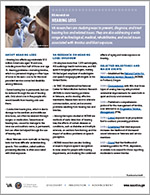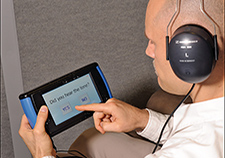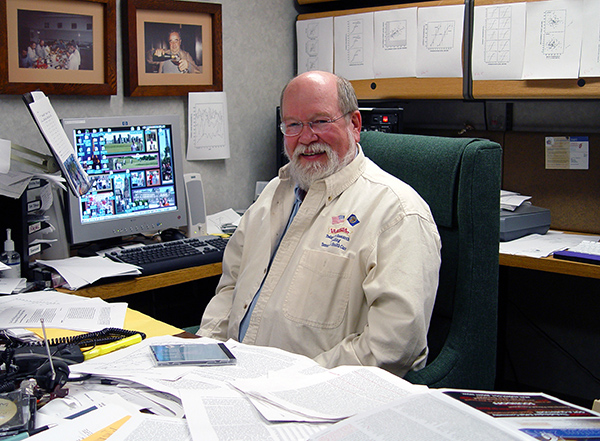Office of Research & Development |
 |
Hearing loss affects approximately 37.5 million Americans aged 18 and over, including more than half of those over age 75. Hearing problems—including tinnitus, which is a perceived ringing or other type of noise in the ears—are by far the most prevalent service-connected disability among American Veterans.
Some hearing loss can be reversed through surgery or medication. In other cases, hearing loss is permanent, but can often be improved through the use of hearing aids. Only about one in five people who would benefit from hearing aids uses them, according to the National Institute on Deafness and Other Communication Disorders.
Conductive hearing loss, which is due to damage to the eardrum and middle ear structures, can often be reversed through surgery or medication. Sensorineural hearing loss, caused by damage to the inner ear and auditory nerve, is permanent, but can often be helped through the use of hearing aids. In addition, many Veterans score normally on hearing tests but have difficulty understanding speech. This condition, called auditory processing disorder, is often associated with blast exposure.
As of fiscal year 2020, more than 1.3 million Veterans were receiving disability compensation for hearing loss, and more than 2.3 million received compensation for tinnitus, according to the Veterans Benefits Administration compensation report.
VA employs more than 1,370 audiologists, 410 audiology health technicians, and 450 speech-language pathologists, making VA the largest employer of audiologists and speech-language pathologists in the United States. They provide hearing services that include screening and prevention, treatment of hearing loss and balance disorders, tinnitus education and management, and auditory rehabilitation services to optimize residual hearing at 490 VA sites of care.
VA researchers are studying ways to prevent, diagnose, and treat hearing loss and related issues. They are also addressing a wide range of technological, medical, rehabilitative, and social issues associated with tinnitus and blast exposure.
If you are interested in learning about joining a VA-sponsored clinical trial, visit our research study information page.
In 1997, VA established NCRAR to study hearing problems in Veterans, and to develop effective treatments. Researchers work to alleviate communication, social, and economic problems in Veterans resulting from hearing loss and tinnitus.
Among the topics studied at the center are methods of early detection of hearing loss; the effects of certain diseases or conditions, such as diabetes and multiple sclerosis, on auditory functioning; and the impact of auditory problems on speech perception.
NCRAR researchers are also looking for ways to improve speech recognition in noisy areas for people with hearing impairments and are studying the combined effects of aging and noise exposure on hearing.
Hearing aids are small electronic devices worn inside or behind the ear that amplify sounds for a person with hearing impairment. Although hearing devices have been used for centuries, the first electronic hearing aid was developed in the early 1950s. These devices have become smaller and more sophisticated over time.
It is VA policy that all Veterans enrolled in VA health care are eligible for medical services that include diagnostic audiology. Many Veterans are also eligible to receive hearing aids from VA.
Developing more advanced hearing aids—In 1992, VA and NIH began an innovative collaboration to support the development of more advanced hearing aids. Among the research projects funded were studies looking at how hearing aids affect speech understanding in both noisy and quiet environments, and how to measure and predict the benefits of hearing aids.
In 1996, NIH and VA initiated the Hearing Aid Clinical Trial, the first large-scale clinical trial to demonstrate the effectiveness of three types of hearing aids in both quiet and noisy environments for a wide range of individuals with hearing loss. The study showed that all three types of hearing aids provide substantial improvement in hearing in both conditions.
Cochlear implants are the best treatment currently available for moderate to severe sensorineural hearing loss, a type of hearing loss caused by damage to the structures in the inner ear or the auditory nerve. Implants have two parts, a microphone worn behind the ear and a receiver inside the ear that sends information to the auditory nerve. VA provides this procedure and follow-up care for Veterans, many of whom have sensorineural hearing loss from aging or exposure to loud noises in combat.
A 2019 study by researchers at the VA Portland Health Care System and the Oregon Health and Science University surveyed census data that included 19.9 million Veterans. They found that half of those Veterans lived at least 80 miles away from a VA health care facility that provided cochlear implant care. Nearly 4 million Veterans lived more than 160 miles away from a VA facility that offered the service.
The team found Veterans from urban areas, on average, lived 61 miles from the nearest VA health care facility, compared to 119 miles for their rural counterparts. The researchers were struck by the number of medium-sized and large cities in which no VA facility performed cochlear implants. They concluded that many Veterans who need cochlear implants may experience difficulties in accessing specialized hearing services.
Tinnitus is the number-one disability among Veterans and affects nearly 15% of American adults, according to the Centers for Disease Control and Prevention. People with tinnitus hear ringing, buzzing, high-pitched whistling, or many other sounds in one or both ears when no external sound is present.
The effects of tinnitus vary from person to person. Because the condition has many different causes, VA has adopted an interdisciplinary approach to treatment—relying on a team of health providers. Many times, there is no cure for tinnitus. In that case, VA's goal is to make the sounds less noticeable or to help Veterans better cope with their condition.
Many people with tinnitus do not seek medical help for the condition—it does not significantly affect their sleep or ability to concentrate. However, people who are distressed by their symptoms may experience mental health issues like depression or anxiety.
Tinnitus rates increasing in active duty service members—Tinnitus rates in active duty service members have increased significantly in recent years, according to a 2019 study by researchers at the South Texas VA Health Care System and the University of Texas at San Antonio.
The research team studied the health records of more than 85,000 active duty service members. They found that the rate of tinnitus in that group more than tripled during the period of 2001 to 2015. The team estimated that 1.8 of every 1,000 service members had tinnitus in 2001. By 2015, 6.3 out of 1,000 people had tinnitus.
This was the first study to assess tinnitus rates in active duty personnel instead of Veterans, according to the investigators. They believe further studies are needed on how hearing damage impacts this group.
Tinnitus and mental health disorders—A 2019 study that followed more than 600,000 Veterans who received care at VA from 2011 to 2016 found that nearly 4% met the diagnostic criteria for tinnitus. The study, led by an NCRAR team, found that tinnitus in these Veterans was often co-diagnosed with hearing loss and traumatic brain injury, and was also associated with mental health diagnoses including anxiety, depression, and substance use disorders.
Other factors associated with tinnitus included sex, age, race, marital status, and VA service-connected status. Veterans with tinnitus also used VA health care more than those without the condition. The researchers stressed the need for coordinated care between tinnitus and mental health care services for Veterans using VA health care.
A 2021 study by NCRAR researchers looked at a random sample of nearly 900 Veterans diagnosed with tinnitus. The investigators found that the likelihood of screening positive for posttraumatic stress disorder (PTSD), depression, or anxiety was increased for those who reported moderate, severe, or very severe tinnitus. The team concluded mental health symptoms are strongly associated with tinnitus severity.
Deep brain stimulation may treat tinnitus—In a 2019 study, researchers from the VA San Francisco Health Care System and the University of California investigated the safety and efficacy of deep brain stimulation (DBS) to treat severe tinnitus in a small group of patients. They found the procedure to be safe and the results encouraging.
DBS is currently performed to treat a variety of movement disorders, including Parkinson’s disease, and some psychological disorders. During surgery, electrodes are implanted in the brain in key areas. The electrodes are connected by a wire to a pulse generator, a battery-operated device that is implanted just under the skin. The generator delivers electrical stimulation to the brain to disrupt abnormal electrical impulses.
The team tested the DBS technique on five patients with tinnitus and observed them for 24 weeks. They found significant clinical improvement in four patients, with only one patient finding no relief. There was no serious surgery- or stimulation-related adverse effects. The team hopes to use a more personalized approach in the next phase of clinical trials.
Sound emitting device may reduce tinnitus—A sound-emitting device worn in the ear during sleep may train the brain to ignore tinnitus, according to researchers from the VA Portland Health Care System and Oregon Health and Science University.
In a 2017 study, the team randomly assigned 60 patients with tinnitus to sleep with one of three sound-therapy devices. They included a customized in-ear device that played sounds matched to the ringing sounds of tinnitus, an in-ear device that let patients select a pre-set sound, or a bedside noise machine.
After three months, patients with all three devices reported being less bothered by their tinnitus. People with the customized in-ear device, however, reported a greater reduction in the volume of ringing in their ears. The researchers believe that listening to these sounds while sleeping helps the brain ignore tinnitus.
TBI and PTSD increase tinnitus risk—In 2019, researchers at the VA San Diego Healthcare System assessed the hearing of 2,600 Marines before and after combat deployment. They found that both PTSD and traumatic brain injury (TBI) are linked to worsening tinnitus, particularly among Veterans who suffered TBI as the result of a blast exposure.
Marines who had tinnitus before deployment for combat were likely to see the condition continue or worsen after their deployment. The team found that tinnitus progression also increased with hearing loss. They concluded that screening for PTSD, TBI, and hearing loss may allow for more focused treatment for tinnitus in these service members and Veterans.
NOISE study—NCRAR is conducting a study called “NOISE,” to better understand the long-term effects of military noise exposure and the causes of hearing loss and tinnitus in Veterans. Early results found that the prevalence of hearing loss in the sample was 8% for low frequencies (0.25 to 2 kHz), 20% for high frequencies (3 to 8 kHz), and 39% for extended high frequencies (9 to 16 kHz). They also found the prevalence of tinnitus was 53%, and the prevalence of both hearing loss and tinnitus was higher among Veterans with higher age, more years of military service, greater degree of noise exposure, and exposures to blasts and/or TBI in the military. Tinnitus was most prevalent among participants who serve/served in the Army relative to the other military branches.
Veterans interested in enrolling in the continuing study, can find our more information here.
Progressive Tinnitus Management—In 2006, an NCRAR research team developed the Progressive Tinnitus Management (PTM) approach. PTM is the culmination of years of studies and clinical trials and is designed to address the needs of all patients with tinnitus while effectively utilizing VA's clinical resources.
Throughout the PTM process, Veterans work with a team of clinicians to create a personalized action plan to help manage their reactions to tinnitus and make it less of a problem. The five levels of management in the program include triage, evaluation, group education, interdisciplinary evaluation, and individualized support.
In 2016, VA announced that audiologist Dr. James Henry, credited with leading the development of the PTM approach, was the recipient of the department's Paul B. Magnuson Award. The Magnuson Award is the highest honor given to investigators by VA's Rehabilitation Research Service.
In 2019, VA conducted a randomized controlled trial to evaluate the efficacy of delivering coping skills education, part of the PTM process, by telephone. Some study participants received five telephone appointments—two taught the use of therapeutic sound and three taught coping skills derived from cognitive behavioral therapy. Other participants were put on a wait list. The trial showed that PTM can measurably improve patient’s outcomes when delivered remotely.
NCRAR has developed clinical handbooks and educational materials on tinnitus care. For patient information on tinnitus, visit the patient resources webpage. For information on progressive tinnitus management, visit the clinical resources webpage.
Older Veterans with hearing and vision loss receive the same level of care as those without sensory loss, according to a 2020 study conducted by researchers at the Corporal Michael J. Crescenz VA Medical Center in Philadelphia.
The team looked at data on more than 42,000 deceased Veterans at 145 VA medical centers and found that end-of-life care quality indicators were similar between patients with and without sensory loss. They measured three indicators of high quality, end-of-life care—palliative consultation in the last 90 days of life, death in a non-acute setting, and contact with a chaplain. They also used VA’s Bereaved Family Survey to evaluate quality of care, pain, and PTSD management; perceptions of communication; emotional and spiritual support; and information about death benefits in the last month of life.
Patients with hearing loss had slightly lower pain management scores and less satisfaction with communication, while those with vision loss were less likely to have received a palliative care consult or contact with a chaplain.
Many Veterans who have served in Iraq and Afghanistan have been exposed to explosions during their service. VA researchers are learning about the varied effects of blast exposures on the brain. Among these effects are hearing loss, which can occur in Veterans even when there is no obvious physical injury. A blast can compromise not only the ear itself, but also the connection between the ear and the brain.
Blast exposures linked to decreased sound tolerance—Being exposed to blasts increases the likelihood of decreased sound tolerance in Veterans and service members, according to a 2019 study by researchers at the VA Portland Health Care System. People with decreased sound tolerance experience negative reactions to everyday sounds, such as being overwhelmed by background noise in a public place.
The research team looked at data on 426 Veterans and service members. They found that 33% of service members and 48% of Veterans with blast exposure had decreased sound tolerance. Among those who had not been exposed to blasts, 28% of service members and 38% of Veterans had decreased sound tolerance.
The team believes more study is needed to understand the connection between blast exposure and sound tolerance, and to find out if related auditory injuries are going unchecked.
Prevalence of hearing loss among Iraq and Afghanistan Veterans—A 2017 study by the Chronic Effects of Neurotrauma Consortium (CENC) found that 7.8% of Iraq and Afghanistan Veterans had been diagnosed with hearing loss, 6.5% were diagnosed with tinnitus, and 6.2% had both conditions. The team looked at the records of more than 570,000 Veterans who had been cared for by VA for at least three years.
Veterans who had been exposed to blasts were more likely to have hearing loss and/or tinnitus, as were those with TBI, PTSD, depression, and other sensory issues such as visual problems, vertigo, dizziness, or headaches. Older males who served in the Army or the Marines were most likely to have hearing loss. White Veterans were more likely to experience hearing loss or tinnitus, while Black Veterans were less likely to have these conditions.
CENC is a research project, funded by VA and the Department of Defense, that addresses the long term effects of mild TBI on service members and Veterans.
Most people are able to understand a distinct voice in a crowded, noisy room. This experience is commonly known as the “cocktail party effect.” This skill requires the brain to focus in on a single voice, while screening out other sounds. However, people with hearing impairment are unable to separate individual voices in a noisy environment. For them, multiple sounds blend together, making it hard to understand speakers.
According to a 2021 study by researchers at the VA Portland Health Care System and the Oregon Health & Science University, this difficulty may be caused by an auditory processing problem. The brain normally blends the sounds it hears from each ear into a single signal—a process called binaural pitch fusion. For people who have an overly broad binaural pitch fusion, their brain blends sounds together in a way that makes speech unintelligible—even when separate voices have different pitches.
Researchers suggest it will now be possible to develop new therapies to improve speech perception for people with this type of hearing impairment.
Development and initial validation of the lifetime exposure to noise and solvents questionnaire in U.S. Service Members and Veterans. Griest-Hines SE, Bramhall NF, Reavis KM, Theodoroff SM, Henry JA. The LENS-Q captures noise exposure over an individual’s lifetime and is a valuable tool for capturing and measuring both military and non-military noise exposure. Am J Audiol. 2021 May 17;1-15.
Mental health symptoms among Veteran VA users by tinnitus severity: a population-based survey. Prewitt A, Harker G, Glbert TA, Hooker E, O’Neil M, Reavis KM, Henry JA, Carlson KF. Mental health symptoms are strongly associated with Veterans’ tinnitus severity. Mil Med. 2021 Jan 25;186(Suppl 1):167-175.
Tinnitus: an epidemiologic perspective. Henry JA, Reavis KM, Griest SE, Thielman EJ, Theodoroff SM, Grush LD, Carlson KF. This report suggests terminology and definitions to promote standards for the clinical definition of tinnitus and ascertainment of its etiology, functional effects, temporal characteristics, psychoacoustic parameters, and risk factors. Otolaryngol Clin Nort Am. 2020 Aug;53(4):481-499.
Noise: acoustic trauma and tinnitus, the US military experience. Theodoroff SM, Konrad-Martin D. Noise-induced tinnitus is multifaceted. By performing a thorough assessment, appropriate action can be taken to best meet the needs of patients. Otolaryngol Clin North am. 2020 Aug;53(4):543-553.
A national study of end-of-life care among older Veterans with hearing and vision loss. Carpenter JG, Ersek M, Nelson F, Kinder D, Wachterman M, Smith D, Murray A, Garrido MM. In general, VA is meeting the end of life care needs of Veterans with hearing and vision loss through palliative care practices. J Am Geriatr Soc. 2020 Apr;68(4):817-825.
Contributions to speech-cue weighting in older adults with impaired hearing. Souza P, Gallun F, Wright F. Listeners who rely to a greater extent on temporal cues lack the ability to discriminate fine-grained spectral information. J Speech Lang Hear Res. 2020 Jan 15;63(1):334-344.
Incidence rates of tinnitus in active duty military service members between 2001 and 2015. Moore BA, Moring JC, Hale WJ, Peterson AL. The incidence rate of tinnitus in U.S. military service members (per 1,000) rose consistently from 1.84 in 2001 to 6.33 in 2015. Am J Audiol. 2019 Dec. 16;28(4):866-876.
Impact of TBI, PTSD, and hearing loss on tinnitus progression in a U.S. Marine cohort. Clifford RE, Baker D, Risbrough VB, Huang M, Yurgil KA. Screening for pre-existing or individual symptoms of PTSD, TBI, and hearing loss may allow for more focused treatment programs of comorbid disorders. Mil Med. 2019 Dec 1;184(11-12):839-846.
Geographic disparities in US Veterans’ access to cochlear implant care within the Veterans Health Administration system. Shayman CS, Ha YM, Raz Y, Hullar TE. Large disparities exist in the distance Veterans have to travel to the nearest VA-based cochlear implant facilities. JAMA Otolaryngol Head Neck Surg. 2019 Oct 1;145(10):889-896.
Phase I trial of caudate deep brain stimulation for treatment-resistant tinnitus. Chung SW, Racine CA, Henderson-Sabes J, Demopoulous C, Molinaro AM, Heath S, Nagarajan SS, Bourne Al, Rietcheck JE, Wang SS, Larson PS. Bilateral caudate nucleus neuromodulation by DBS for severe, refractory tinnitus showed very encouraging results. J Neurosurg. 2019 Sep 24;1-10.
Decreased sound tolerance associated with blast exposure. Theodoroff SM, Reavis KM, Griest SE, Carlson KF, Hammill TL, Henry JA. Blast exposure increased the likelihood of participants reporting decreased sound tolerance. Sci Rep. 2019 Jul 15;9(1):10204.
Health care utilization and mental health diagnoses among Veterans with tinnitus. Carlson KF, Gilbert TA, O’Neil ME, Zaugg TL, Manning CA, Kaelin C, Thielman EJ, Reavis KM, Henry JA. Veterans who are diagnosed with tinnitus have more health care utilization and are more frequently diagnosed with mental health disorders than Veterans who are not diagnosed with tinnitus. Am J Audiol. 2019 Apr 22;28(1S):181-190.
Telephone-based progressive tinnitus management for persons with and without traumatic brain injury: a randomized controlled trial. Henry JA, Thielman EJ, Zaugg T, Kaelin C, McMillan GP, Schmidt CJ, Myers PJ, Carlson KF. There is strong support for the use of tele-PTM for persons with bothersome tinnitus, regardless of whether the person also has TBI symptoms. Ear Hear. 2019 Mar/Apr;40(2):227-242.
Randomized controlled trial of a novel device for tinnitus sound therapy during sleep. Theodoroff SM, McMillan GP, Zaugg TL, Cheslock M, Roberts C, Henry JA. A customized stimulus from the Otoharmonics Levo System reduces tinnitus perceptions and reactions for people with bothersome tinnitus. Am J Audiol. 2017 Dec 12;26(4):543-554.
Prevalence of hearing loss and tinnitus in Iraq and Afghanistan Veterans: A Chronic Effects of Neurotrauma Consortium study. Swan AA, Nelson JT, Swiger B, Jaramillo CA, Eapen BC, Packer M, Pugh MJ. Among 570,332 Iraq and Afghanistan Veterans, 7.78% have been diagnosed with hearing loss alone, 6.54% with tinnitus alone, and 6.24% with both hearing loss and tinnitus. Hear Res. 2017 Jun;349:4-12.

Download PDF
 VA ear surgeon studies management of severe hearing loss in Veterans
VA ear surgeon studies management of severe hearing loss in Veterans
 Dr. James Henry receives VA's Magnuson Award for advancing tinnitus treatment
Dr. James Henry receives VA's Magnuson Award for advancing tinnitus treatment
 New device helps halt hearing loss for cancer patients
New device helps halt hearing loss for cancer patients
 Audiology pioneer, now retired, looks back at 42-year VA research career
Audiology pioneer, now retired, looks back at 42-year VA research career
How a Veteran’s homemade solution turned into a hearing device that could help thousands, Today, May 26, 2021
Study explains ‘cocktail party effect’ in hearing impairment, ScienceDaily, Apr. 21, 2021
Deep brain stimulation for refractory severe tinnitus, EurekAlert, Sept. 24, 2019
VA facilities offering cochlear implants to vets are few and far between, Reuters, Aug. 23, 2019.
Sound therapy may train the brain to ignore tinnitus, Reuters, Jan. 19, 2018
Deafened by rare disease at 12, today a VA scientist, VA VAntage Point, June 1, 2021
Free captioned telephone service for those with hearing loss, VA VAntage Point, March 19, 2021
Technology and best practices help Veteran hear again, VA VAntage Point, Feb. 8, 2021
Better hearing for Veterans, remotely, VA VAntage Point, June 24, 2020
VA is America’s largest employer of audiologists and speech-language pathologists, VA Vantage Point, May 18, 2020
Veteran: “I’m hearing better now than I have in 20 years,” VA VAntage Point, July 9, 2019
Prescribing and providing eyeglasses, contact lenses, and hearing aids, VA Directive 1034, Oct. 24, 2019
Quality of care: hearing loss, Department of Veterans Affairs
Hearing center of excellence, U.S. Department of Defense
Hearing loss, Centers for Disease Control and Prevention
Hearing loss, U.S. Library of Medicine, Medline Plus
Hearing loss, NIH National Institute on Aging